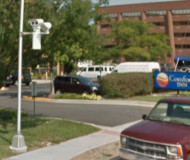7/27/2018
Virginia Court Upholds Red Light CamerasJudge in largest Virginia county upholds red light camera program in first suit to challenge its constitutionality.

Virginia law has until recently forbidden legal challenges to red light camera programs. Trials were blocked in courts with the power to set precedent until state law changed in 2015 to explicitly allow such appeals. Earlier this month, a Fairfax County Circuit Court judge issued the jurisdiction's first-ever ruling siding with the use of automated ticketing machines.
Tawana Jean Cooper had challenged the ticket she received in the mail from the private vendor working on behalf of the city of Fairfax. Her red sedan had been photographed making slow right turn on a red light at the intersection of Jermantown Road and Fairfax Boulevard.
Cooper argued the program was unconstitutional because it deprived recipients of their due process rights. Registered vehicle owners, who may not have been driving the photographed vehicle, must prove their own innocence in a hearing that severely limits defense options while allowing the city to use hearsay as evidence. Judge Randy I. Bellows found that rights do not apply because the General Assembly authorized photo ticketing as a civil program.
"The court concludes that the red light camera program imposes a civil penalty in a civil proceeding, not a criminal penalty in a criminal proceeding," Judge Bellows wrote. "This conclusion is consistent with the judgment reached by numerous courts in other jurisdictions that have examined the issue and have found similar ordinances to be civil in nature."
Virginia courts operate under the strong presumption that the laws passed by the legislature are constitutional. The court here was satisfied by Virginia's unique red light camera provisions that require personal service of citations (meaning red light camera tickets that have only been mailed can be ignored), and that allow the accused to submit an affidavit stating he was not driving the vehicle. Most other states do not offer similar protections.
"With respect to due process, the defendant claimed that her trial was rendered unfair because an officer without personal knowledge was permitted to testify at trial," Judge Bellows wrote. "The court finds this argument to be without merit. The officer's testimony was consistent with her certification and was very limited in nature... Moreover, the officer acknowledged that she was not present at the time of the incident and did not know who was driving the vehicle."
The court ordered Cooper to pay $50.
A copy of the ruling is available in an 6mb PDF file at the source link below.


